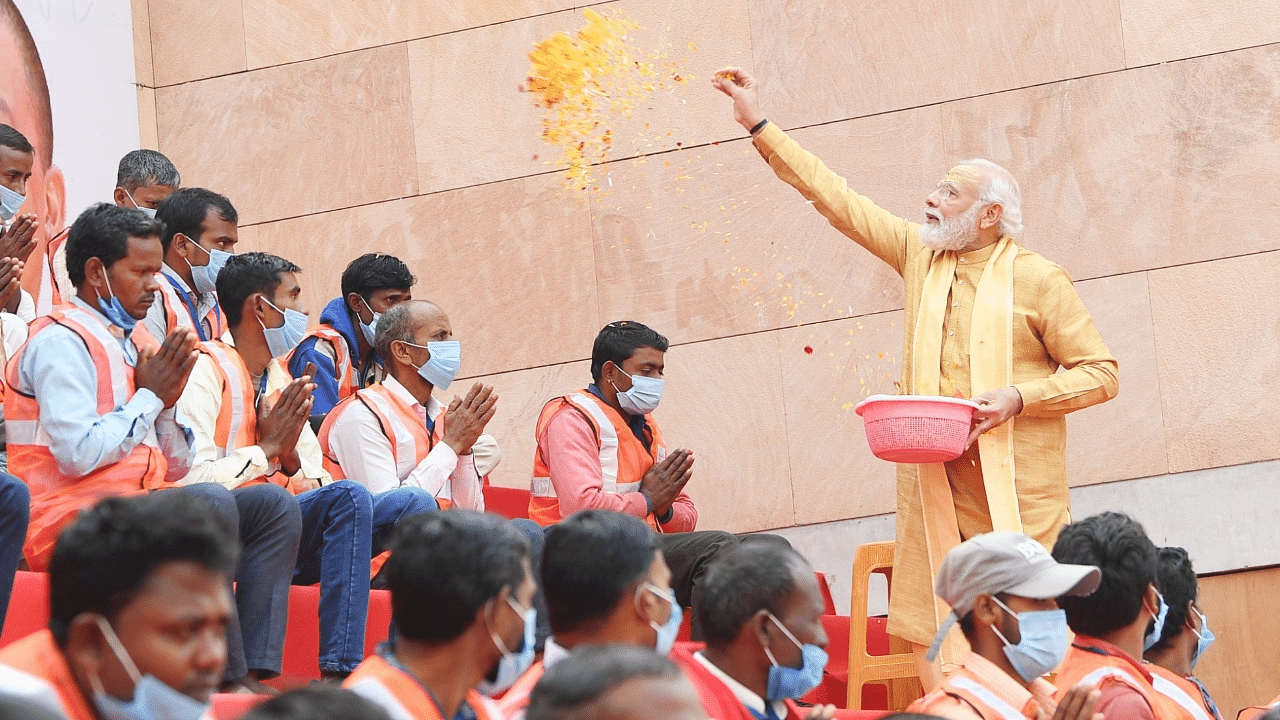
Every community — religious, linguistic or caste-based — has the right to assert itself, particularly in a democracy, as it restricts the assertion within the framework of the law. No one can deny the Hindu community this inherent right. Instead, it is incumbent upon us to understand that the more we object to such efforts, the more momentum it will gather.
The inauguration of the Kashi Vishwanath corridor is another milestone in the assertion of the 'Hindu'. While expressing concerns about it, and there are some genuine reasons for it, we must remember such developments are not unprecedented in independent India. The Ayodhya temple's shilanyas (foundation laying) ceremony was allowed in 1989 in full connivance of the late Rajiv Gandhi, the then prime minister of India.
About the presence of Prime Minister Narendra Modi at Kashi Vishwanath, we should recall that Mamata Banerjee, the chief minister of West Bengal and now an icon of the secular brigade, inaugurates several Durga Pujas every year. We also have the tweet of the Delhi Chief Minister, Arvind Kejriwal, of December 3. It read, "A few days ago when I had visited Shri Ramlala in Ayodhya, a thought came to my mind that I should bring all my elders of Delhi for a darshan of Lord Shri Ram. The first train of pilgrimage was flagged off from Delhi to Ayodhya today. These were very emotional moments for me. May everyone's journey be blessed. Long live Rama." Kejriwal himself inaugurated the train. These examples and innumerable others underscore that religion and religious symbolism are used in this country by leaders on both ends of the spectrum - hardcore seculars and hardcore Hindutwavadis.
Again, in the long run, it is futile to object to such symbolism on the ground that the Preamble of our Constitution says India is 'secular'. In 1948, when Prof KT Shah, who represented Bihar, brought a proposal in the Constituent Assembly that "India shall be a Secular, Federal, Socialist Union of States", BR Ambedkar, the Dalit icon often referred to as the maker of the Indian Constitution, strongly opposed it.
While arguing the Constitution was secular, Ambedkar said, "What should be the policy of the State, how the society should be organised in its social and economic side are matters which must be decided by the people themselves according to time and circumstances. It cannot be laid down in the Constitution itself because that is destroying democracy altogether." Ignoring Ambedkar, the word 'secular' was inserted in the Preamble in 1976, and it can be deleted too if Parliament so wishes.
So, then, on what ground we may raise questions on the inauguration of the Kashi Vishwanath corridor, particularly when it is built on land (including the Gyanvapi Koop and Nandi idol) made available without any controversy? We will gain nothing by criticising the effort, which is a part of Hindu assertion. But we must express concern about the inherent intention of using it in the Uttar Pradesh Assembly elections and in the future to further the agenda of political Hindutva, which targets the 'others'.
Here, the line of distinction is thin but essential. Unlike Hindutva, the Hindu way of life that has thrived in this land for thousands of years is secular, though it is also associated with a plethora of religious rituals. But, at the core, it is about dharma (whatever 'holds' an individual, a family, a community, and the creation as a whole) and karma (deeds in consonance with dharma).
Most importantly, dharma has in its fold rajdharma, which signifies protecting all the subjects who have not done wrong. The Indian Muslims and other minorities consisting of one-fifth of the Indian population have a place of pride among the subjects (now called citizens) of India. So a true Hindu, particularly a ruler, is bound to protect the innocent minorities and their genuine interests.
In simple terms, the resurrection of the concept of a timeless Kashi, protected by its kotwal Kal Bhairav, is tantamount to going back to the roots. It cannot be used to muzzle the rights of anyone. According to Hindu scriptures, Shiva means 'perfection'. This concept, secular by nature, cannot be towed into any controversy like "mandir wahin banayenge (the temple shall be constructed there)". It will be profane to drag the transcendental into base political fights.
Also Read | Kashi Vishwanath Corridor: Locals unhappy over 'lost homes', demolition of iconic building
As a political party, the BJP often uses Ram, Krishna (who were humans, real or mythical) and even Shiva (the transcendental) for narrow political gains. Worse, it uses such figures to target the 'others' and thus violates the concept of rajdharma. Unfortunately, our secular leaders and intellectuals do not care to counter the BJP on the grounds of dharmic philosophical thought and allow it to usurp the entire 'Hindu' space.
In fact, the Rashtriya Swayamsevak Sangh (RSS) will do well if it realises that assertion of the Hindus, something started by Swami Vivekananda one and a half-century ago, will be bereft of its true glory if it targets the 'others'. But, perhaps, it is futile to expect the Sangh may shun narrow Hindutva to embrace the true 'dharmic' path, which is the essence of the Hindu way of life.
(The writer is a journalist and author based in Kolkata)
Disclaimer: The views expressed above are the author's own. They do not necessarily reflect the views of DH.
Watch the latest DH Videos here: